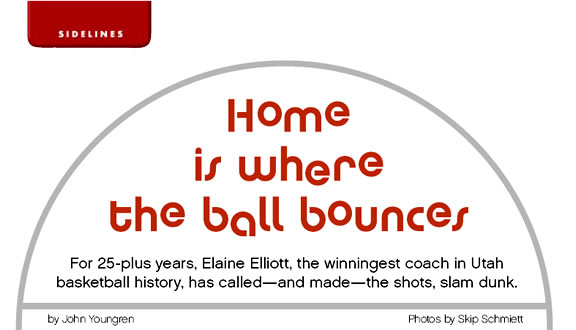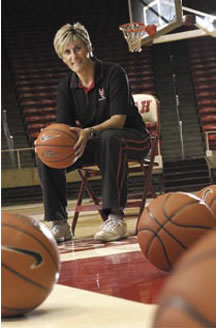
Vol. 14 No. 3 |
Winter 2004-05 |

In her early 20s, when she first started at the University of Utah, Elaine Elliott was not much older than the kids she had been asked to help coach.
It was 1979, and legendary Utah women’s basketball coach Fern Gardner was four years from the end of her coaching career. Elliott was a fresh young face in women’s coaching, a Tacoma, Wash., native who had been a four-sport star (basketball, volleyball, field hockey and softball) at Boise State.
Elliott had been head coach at Boise High School; Gardner made her a Utah assistant.
Twenty-five years later and it’s funny how the ball bounces.
 Elliott
has long since become Utah’s head coach and now has her own legendary
reputation—400-plus wins and 11 NCAA Tournament appearances in the
books.
Elliott
has long since become Utah’s head coach and now has her own legendary
reputation—400-plus wins and 11 NCAA Tournament appearances in the
books.
Elliott is entering her 22nd year at the helm of the Utes, generally regarded as one of the most successful women’s programs in the country.
"It’s kind of interesting—it’s not like I had any kind of master plan," Elliott says today, in her spacious office at the Huntsman Center on the U campus. "But here I am. When I think about it, it seems like a long time, but it’s not the same job. It’s like I continue to start over."
Maybe so, but there has been a common denominator in Elliott’s career: her success. She has coached players of different eras, styles, sizes and talents, but has made the most of them all, garnering a 437-178 record as Utah head coach, including nine 20-win seasons in the past 10 years alone.
She’s one of just 20 active NCAA Division I women’s basketball coaches with 400 wins or more at their current programs and—no surprise—she’s the winningest coach in Utah basketball history, with nine regular-season conference titles, three divisional crowns and five league tournament championships.
The numbers go on and on.
But Elliott will tell you she’s the last one to rest on her success ("It’s not necessarily the best thing, but I don’t think back on things a lot. I want to keep going ahead and move on"), and so each season is a new challenge, a fresh set of expectations.
"Collegiate challenges don’t go away," she says. "It’s been a good run, but it can also be a burden we’ve created here. You have to prove it, year after year. Even 22 years later, you can’t drop off."
Last season was particularly challenging for the Utah coach. With an impressive 24-7 record, the Utes earned a share of the Mountain West Conference crown and finished in the top 25. But the Utes weren’t invited to the NCAA Tournament.
One of the most successful regular seasons in Utah’s women’s basketball history ended up with the team and its none-too-happy coach sitting at home.
"Our team was good enough [to move to the tournament]," Elliott says. "But it’s over. I don’t stay up nights worrying about things I don’t have any control over."
She admits to other frustrations: For all their on-court success, the Utes have never consistently been a major attendance draw, despite Elliott’s efforts to reach out to new fans over the years. And things like how many people will be in the seats—or, even, how many times the team will appear on TV—are more and more frequently sticking points with potential recruits looking for the high profile.
 "That
is our biggest challenge," Elliott says. "Right now, the kids
who come here don’t come here for that [type of] experience."
"That
is our biggest challenge," Elliott says. "Right now, the kids
who come here don’t come here for that [type of] experience."
The good outweighs the bad, of course. After all, Elliott wouldn’t
still be doing it if she didn’t believe.
"Coach Elliott has built a wonderful program," says Elliott’s boss, Utah Athletic Director Chris Hill. "She has done what is probably one of the most difficult tasks in athletics—creating high expectations year in and year out and reaching those expectations."
Year in and year out.
For her part, Elliott brushes off the accolades and honors. Her outer office is rimmed with a few mementos of her career—the 400-win ball and a handful of scattered trophies, photos and articles—but it’s not a shrine to yesterday. Her manner, interaction with her staff and general demeanor seem much more about tomorrow, and, for that matter, the day after that.
Each year, she says, is about doing the most possible with the "new group," the collection of players who come together to serve under one of the most successful coaches in the country.
"The athletes themselves have changed over the years," Elliott says, comparing eras and players, skills and conditioning. "The women today are bigger and stronger than they were, top to bottom. We’re in a more athletic realm today."
How that plays out on the court is an ever-evolving process, according to the coach, who says each year—and each generation of players—brings the challenge of matching the fundamental lessons of Elliott’s philosophy with athletes born several years (sorry, Coach!) after the Elliott coaching era began.
"We’re pretty well-known for teaching fundamentals, for developing a good basketball intellect," Elliott says of her staff’s reputation, reflective of her long-term instincts and approach. "Our program’s reputation is ‘coaches of the game,’ and we have a great reputation for what we do."
But that doesn’t mean Elliott can simply dust off the old playbook from 1986 and roll the balls out, because the game, its style and its athletes have evolved much beyond that.
"What I like is the challenge of taking [the current players] and getting a handle on who we are now and what we need to do to be successful," she says.
That doesn’t mean she hasn’t mellowed, Elliott admits, or that the relationship she has with her players hasn’t changed over the years.
A couple of decades ago, she related to some of them almost more as peers at times. Now, 25 years later, she’s literally coaching kids whose parents once played for her.
"I hope I’m smarter, a better coach," Elliott says. "Wisdom does come—it’s impacted my approach to things to some extent."
It also means she sometimes has to rely on her younger staff to communicate with the players she encounters, particularly during the recruiting process and the like: "It’s a bit of a reach for me when they want to chit-chat about prom," she says.
She laughs now when she remembers her younger days, when her temper was quicker and the frustration would come faster—with her players, their play, the referees, the opponent, the game in general.
"One thing that’s never changed is my competitiveness. It still tempers everything I do," she says, adding that the competitive spirit is one thing when you’re on the sidelines coaching a major university basketball team, quite another when you’re enjoying a round of golf with some friends and you miss the putt on 18.
"Who needs to be so competitive 24 hours a day?"
Over the years, Elliott has had to force herself to relax more and enjoy time away from coaching, which, she says, is one reason she still enjoys the job. She loves Utah’s outdoor scenery, and to hike and mountain bike and take her dogs to play in the river. She likes to read and says she’s a putterer, constantly working on her house or starting a new project in her yard.
She’s a student of the game but won’t let herself become obsessed with it: "I will never let myself get there," she says. "There are too many other things that matter in life."
Still, she admits to thinking about "making another run," like the Utes did in 2000-01, when the team went 28-4 and to the Sweet 16, finally ending their NCAA trip with a loss to eventual national champion Notre Dame.
"Success in this business is making that run, and I want to do that again," she says.
Chances are, she’s going to have several opportunities. At 48, she’s not exactly ready to retire. And, unless something dramatic happens, she sees her future at Utah, in a job that has adapted to suit her style, both personally and professionally, over the years.
"She’s obviously done a tremendous job," Hill says of Elliott.
And today, nearly three decades after getting her start, Elliott admits to a further—somewhat unexpected—source of satisfaction: serving as the head of an extended Utah women’s basketball family, branching out from past players and coaches to their offspring.
The Utes have organized a reunion or two over the years, and often, Elliott will get a call from a former player or one will stop by just to say "hi" or ask for some advice.
"She represents what is best about college athletics," Hill says of Elliott, who can’t help but smile when she thinks of the kids she sees in today’s summer camps, the young players whose games have been honed by a former Utah athlete mentored somewhere over the years by Elliott. "That’s something that’s been special. We’ve been able to build a link with all these kids who’ve been here. I know all of them," she says. "There’s a longevity, a connection that runs through. This is home."
Where the ball bounces.
—John Youngren works in advertising for Love Communications in Salt Lake City and has written many previous articles for Continuum.